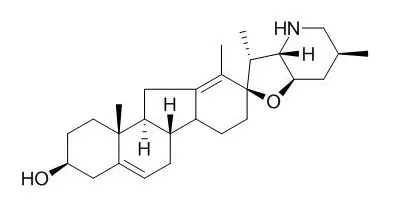| Kinase Assay: |
| Cancer Lett. 2007 Oct 8;255(2):300-6. | | The hedgehog pathway inhibitor cyclopamine increases levels of p27, and decreases both expression of IGF-II and activation of Akt in PC-3 prostate cancer cells.[Pubmed: 17602833 ] | The hedgehog signalling inhibitor Cyclopamine has been shown to induce growth inhibition and cell cycle arrest in prostate cancer cell lines, but the mechanism of action has not been clearly defined, and observations between laboratories have not always been consistent.
METHODS AND RESULTS:
We first observed that albumin can protect PC-3 prostate cancer cells from Cyclopamine-induced growth inhibition, suggesting that Cyclopamine binds to albumin, and that only free Cyclopamine is active. We then conducted a phospho-site protein kinase screen to elucidate the mechanism of Cyclopamine-induced growth inhibition. Treatment of PC-3 cells with 5 or 10 microM Cyclopamine for 72h resulted in a decrease in cell viability of approximately 50% and approximately 75%, respectively. A phospho-site protein kinase screen showed that Cyclopamine decreased levels of phospho-Thr(187)-p27 by 71%. This phospho-site on p27 positively regulates its ubiquitin degradation; therefore a decrease in phospho-Thr(187)-p27 should correlate with increased levels of p27. Consistent with this hypothesis, treatment of PC-3 cells with Cyclopamine resulted in a approximately 3-fold increase in p27 protein levels. Cdk-2 phosphorylates Thr(187)-p27, and immunoblotting demonstrated that Cyclopamine treatment of PC-3 cells reduces the expression of cdk-2. Furthermore, Cyclopamine decreased the levels of phosphorylated (activated) Akt, which is known to increase p27 degradation via Skp-2-induced ubiquitination. The mechanism by which Cyclopamine decreases phosphorylated Akt is currently under investigation, but it may involve our observed Cyclopamine-induced reduction in IRS-1 and IGF-II expression.
CONCLUSIONS:
These results demonstrate novel molecular correlates of Cyclopamine-induced growth inhibition of prostate cancer cells. | | Oncol Lett. 2013 Apr;5(4):1417-1421. | | Cyclopamine is a novel Hedgehog signaling inhibitor with significant anti-proliferative, anti-invasive and anti-estrogenic potency in human breast cancer cells.[Pubmed: 23599805 ] | Stimulation of Hedgehog (Hh) signaling induces carcinogenesis or promotes cell survival in cancers of multiple organs. In epithelial cancer with aberrant Hedgehog activation, abrogation of Hedgehog signaling by Cyclopamine, a naturally occurring Hedgehog-specific small-molecule inhibitor, causes profound inhibition of tumor growth.
METHODS AND RESULTS:
In the present study, Cyclopamine displayed a significant potency in suppressing the proliferation of both estrogen-responsive (MCF-7) and estrogen-independent (MDA-MB-231) human breast cancer cells. Cyclopamine induced a robust G1 cell cycle arrest and elicited notable effects on the expression of cyclin D1 through modulation of the MAPK/ERK signaling pathway. Cyclopamine also inhibited the invasive ability of both breast cancer cell lines by suppressing the expression levels of NF-κB, MMP2 and MMP9 protein. Furthermore, in estrogen-responsive MCF-7 cells, Cyclopamine significantly downregulated the production of estrogen receptor-α protein.
CONCLUSIONS:
Our results implicate Cyclopamine as a novel, potent inhibitor of human breast cancer proliferation and estrogen responsiveness that could potentially be developed into a promising therapeutic agent for the treatment of breast cancer. |
|






 Cell. 2018 Jan 11;172(1-2):249-261.e12. doi: 10.1016/j.cell.2017.12.019.IF=36.216(2019)
Cell. 2018 Jan 11;172(1-2):249-261.e12. doi: 10.1016/j.cell.2017.12.019.IF=36.216(2019) Cell Metab. 2020 Mar 3;31(3):534-548.e5. doi: 10.1016/j.cmet.2020.01.002.IF=22.415(2019)
Cell Metab. 2020 Mar 3;31(3):534-548.e5. doi: 10.1016/j.cmet.2020.01.002.IF=22.415(2019) Mol Cell. 2017 Nov 16;68(4):673-685.e6. doi: 10.1016/j.molcel.2017.10.022.IF=14.548(2019)
Mol Cell. 2017 Nov 16;68(4):673-685.e6. doi: 10.1016/j.molcel.2017.10.022.IF=14.548(2019)